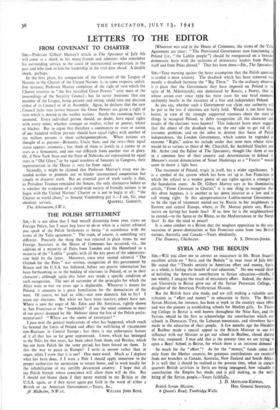THE POLISH SETTLEMENT SIR,—It is not often that I find
myself dissenting from your views on Foreign Policy, but I must beg leave to do so when in a recent editorial you speak of the Polish Settlement as bring " in accordance with the terms of the Yalta agreement." The truth, of course, is something very different. Precisely the thing that was rejected in plain terms by our Foreign Secretary in the House of Commons has occurred, viz., the addition of a minority of Poles from London and the Homeland to a majority of the "Lublin " people, with all the key posts of the administra- tion held by the latter. Moreover, since your second editorial " The Outlook for the Poles " was written, recognition of this government by Britain and the U.S.A. has followed, before any precise information has been forthcoming as to the holding of elections in Poland, or as to their character ; although again this latter was made a specific condition of such recognition. The sort of surrender of the principles for which the Allies went to war six years ago is deplorable. Whatever it means for Poland, it amounts to a great humiliation for the democracies of the west. Of course, we had an alibi,—our own domestic fish to fry! I mean our elections. But while we have been inactive, others have not. Where is now the anger of Mr. Eden and Mr. Stettinius, rightly shown in San Francisco at the " bombshell " (I use the word common to most of our press) dropped by Mr. Molotov about the fate of the Polish parlia- mentarians? " Where are the snows of yesteryear? "
I pass over the general implications of what has happened, which reach far beyond the limits of Poland and affect the well-being of 13o,000,00o non-Russians in Central Europe ; but there is one unfortunate feature of it all that has so far gone unprotested. Lwow, which has belonged to the Poles for 60o years, has been taken from them, and Breslau, which has not been Polish for the same period, has been forced on them. Is this the way to peace in Europe? I write in sorrow rather than in anger, when I avow that it is not! One more word. Much as I deplore what has been done, if I were a Pole I should apply tomorrow to the proper authorities for permission to return home, and to work loyally for the rehabilitation of my terribly devastated country. I hope that all my Polish friends whose conscience will allow them will do this. But I should not blame them if they never wanted to see Britain or the U.S.A. again, or if they never again put faith in the word of either a British or an American Government.—Yours, &c., [Whatever was said in the House of Commons, the terms of the Yalta Agreement are clear: " The Provisional Government now functioning in Poland [i.e., " the Lublin people "] -should be reorganised on a broader democratic basis with the inclusion of democratic leaders from Poland itself and from Poles abroad." That has been done.—En., The Spectator.


























 Previous page
Previous page